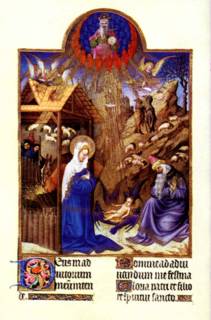May God's blessings be upon you as you prepare for the Christ Mass

The image is from Les Tres Riches Heures du Duc de Berry, 1413-1416.
A Christmas reflection from "Parochial and Plain Sermons" by John Henry Newman, Sermon 2:
He, indeed, when man fell, might have remained in the glory which He had with the Father before the world was. But that unsearchable Love, which showed itself in our original creation, rested not content with a frustrated work, but brought Him down again from His Father's bosom to do His will, and repair the evil which sin had caused. And with a wonderful condescension He came, not as before in power, but in weakness, in the form of a servant, in the likeness of that fallen creature whom He purposed to restore. So He humbled Himself; suffering all the infirmities of our nature in the likeness of sinful flesh, all but a sinner,—pure from all sin, yet subjected to all temptation,—and at length becoming obedient unto death, even the death of the cross.
I have said that when the Only-begotten Son stooped to take upon Him our nature, He had no fellowship with sin. It was impossible that He should. Therefore, since our nature was corrupt since Adam's fall, He did not come in the way of nature, He did not clothe Himself in that corrupt flesh which Adam's race inherits. He came by miracle, so as to take on Him our imperfection without having any share in our sinfulness. He was not born as other men are; for "that which is born of the flesh is flesh." [John 3:6]
All Adam's children are children of wrath; so our Lord came as the Son of Man, but not the son of sinful Adam. He had no earthly father; He abhorred to have one. The thought may not be suffered that He should have been the son of shame and guilt. He came by a new and living way; not, indeed, formed out of the ground, as Adam was at the first, lest He should miss the participation of our nature, but selecting and purifying unto Himself a tabernacle out of that which existed. As in the beginning, woman was formed out of man by Almighty power, so now, by a like mystery, but a reverse order, the new Adam was fashioned from the woman. He was, as had been foretold, the immaculate "seed of the woman," deriving His manhood from the substance of the Virgin Mary; as it is expressed in the articles of the Creed, "conceived by the Holy Ghost, born of the Virgin Mary."
Thus the Son of God became the Son of Man; mortal, but not a sinner; heir of our infirmities, not of our guiltiness; the offspring of the old race, yet "the beginning of the" new "creation of God." Mary, His mother, was a sinner as others, and born of sinners; but she was set apart, "as a garden inclosed, a spring shut up, a fountain sealed," to yield a created nature to Him who was her Creator. Thus He came into this world, not in the clouds of heaven, but born into it, born of a woman; He, the Son of Mary, and she (if it may be said), the mother of God. Thus He came, selecting and setting apart for Himself the elements of body and soul; then, uniting them, to Himself from their first origin of existence, pervading them, hallowing them by His own Divinity, spiritualizing them, and filling them with light and purity, the while they continued to be human, and for a time mortal and exposed to infirmity. And, as they grew from day to day in their holy union, His Eternal Essence still was one with them, exalting them, acting in them, manifesting Itself through them, so that He was truly God and Man, One Person,—as we are soul and body, yet one man, so truly God and man are not two, but One Christ. Thus did the Son of God enter this mortal world; and when He had reached man's estate, He began His ministry, preached the Gospel, chose His Apostles, suffered on the cross, died, and was buried, rose again and ascended on high, there to reign till the day when He comes again to judge the world. This is the All-gracious Mystery of the Incarnation, good to look into, good to adore; according to the saying in the text, "The Word was made flesh,—and dwelt among us."



0 Comments:
Post a Comment
<< Home